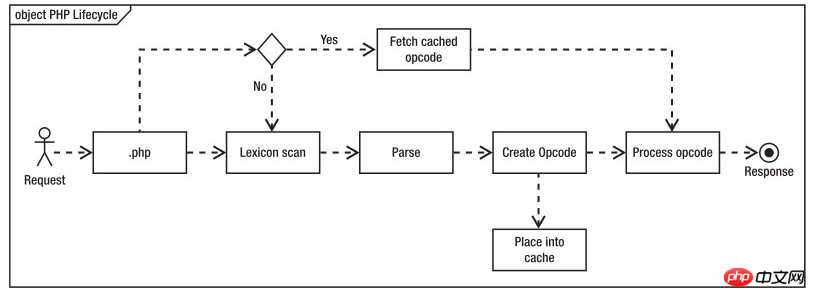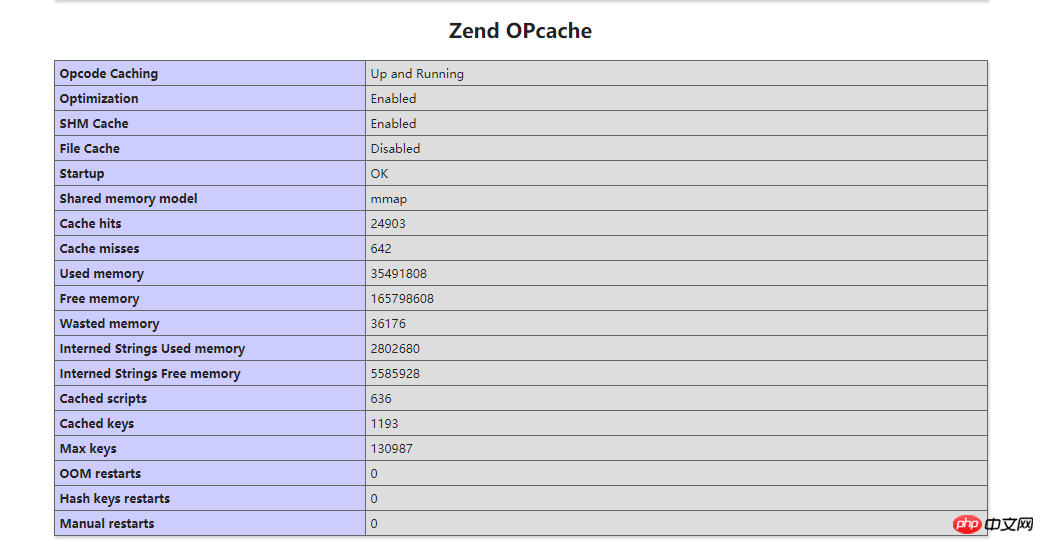 Backend Development
Backend Development
 PHP Tutorial
PHP Tutorial
 How to enable Opcode in PHP7 to create powerful performance Detailed explanation of PHP skills
How to enable Opcode in PHP7 to create powerful performance Detailed explanation of PHP skills
How to enable Opcode in PHP7 to create powerful performance Detailed explanation of PHP skills
This article mainly introduces to you the relevant information on how to enable Opcode in PHP7 to create powerful performance. The article introduces it in great detail through sample code. It has certain reference and learning value for everyone's study or work. Friends who need it can follow Let’s learn together with the editor
Preface
Brother Niao said in his blog that there are several tips to improve the performance of PHP 7, The first is to enable opcache:
Remember to enable Zend Opcache, because PHP7 is faster even without Opcache than PHP-5.6 with Opcache enabled, so during the previous testing period, someone did not enable Opcache.
So what is Opcache?
The predecessor of Opcache is Optimizer, which is a closed-source but free-to-use PHP optimization acceleration component developed by Zend, the official company of PHP. The Optimizer caches the script file Opcode generated by precompiling the PHP code in the shared memory for repeated use in the future, thereby avoiding the time consumption of reading the code from the disk and compiling it again. At the same time, it also applies some code optimization modes to make the code execute faster. Thereby speeding up the execution of PHP.
The normal execution process of PHP is as follows

request request (nginx, apache, cli, etc.) -->Zend engine reads .php file-- >Scan its dictionary and expressions-->Parse the file-->Create computer code to be executed (called Opcode)-->Finally execute the Opcode--> response returns
every time Requesting a PHP script will perform the above steps once. If the PHP source code does not change, then the Opcode will not change. Obviously there is no need to regenerate the Opcode every time. Combined with the ubiquitous caching mechanism in the Web, we can cache the Opcode for future use. Wouldn't it be faster to access cached Opcode directly? The flow chart after enabling Opcode cache is as follows:

The purpose of Opcode cache is to avoid repeated compilation and reduce CPU and memory overhead. .
The following introduces the installation of Opcache
Installation:
1. Find the extension of opcache, mine is php7.1
yum list php71*
2. Install extension
yum install php71w-opcache.x86_64
Configuration:
zend_extension=opcache.so
[opcache]
;Enable opcache
opcache.enable=1;In CLI environment, PHP enables OPcache
opcache.enable_cli=1;OPcache shared memory storage size, unit MB
opcache.memory_consumption=128;PHP uses a technology called string interning to improve performance. For example, if you use the string "foobar" 1000 times in your code, PHP will only allocate an immutable memory area to store the string the first time it is used, and the other 999 times it will be used. Point directly to this memory area. This option will take this feature to the next level - by default this immutable memory area will only exist in a single php-fpm process. If this option is set, it will exist in all php-fpm processes. shared in. In larger applications, this can be very effective in saving memory and improving application performance.
The value of this option is in megabytes. If it is set to 16, it means 16MB. The default is 4MB
opcache.interned_strings_buffer=8;This option is used Used to control the maximum number of PHP files that can be cached in memory. This option must be set large enough to be larger than the sum of all PHP files in your project.
The minimum value of the setting value range is 200, the maximum value is 100000 before PHP 5.5.6, and 1000000 after PHP 5.5.6. That is to say between 200 and 1,000,000.
opcache.max_accelerated_files=4000;Set the cache expiration time (in seconds). If it is 0, it must be checked every time.
opcache.revalidate_freq=60;From Literally means "allowing for faster shutdown". Its role is to provide a faster mechanism to call the destructor in the code at the end of a single request, thereby speeding up PHP's response speed and recycling of PHP process resources, so that the application can respond to the next request more quickly . Set it to 1 to use this mechanism.
opcache.fast_shutdown=1;If enabled (set to 1), OPcache will check the file timestamp (timestamp) in the number of seconds set by opcache.revalidate_freq to check whether the script has been updated.
If this option is disabled (set to 0), opcache.revalidate_freq is ignored and PHP files are never checked. This means that if you modify your code, and then you update it to the server, and then request the function corresponding to the updated code on the browser, you will not see the effect of the update.
It is strongly recommended that you use it in a production environment Set to 0. After updating the code, restart PHP and the web server smoothly.
opcache.validate_timestamps=0;Enable Opcache File Cache (experimental). By enabling this, we can let Opcache cache the opcode cache to an external file. For some scripts, there will be obvious Performance improvement.
In this way, PHP will cache some Opcode binary export files in the /tmp directory, which can exist across the PHP life cycle.
opcache.file_cache=/tmp
View phpinfo :

Test results:

The same interface has been improved from a few hundred milliseconds to about 50ms now

Summary
##Articles you may be interested in:PHP solves the problem of rabbits giving birth to rabbits based on recursive algorithm php tips
Detailed explanation of exception handling in ThinkPHP_php examples
PHP7 PHP skills based on curl-based image upload function
##
The above is the detailed content of How to enable Opcode in PHP7 to create powerful performance Detailed explanation of PHP skills. For more information, please follow other related articles on the PHP Chinese website!

Hot AI Tools

Undresser.AI Undress
AI-powered app for creating realistic nude photos

AI Clothes Remover
Online AI tool for removing clothes from photos.

Undress AI Tool
Undress images for free

Clothoff.io
AI clothes remover

Video Face Swap
Swap faces in any video effortlessly with our completely free AI face swap tool!

Hot Article

Hot Tools

Notepad++7.3.1
Easy-to-use and free code editor

SublimeText3 Chinese version
Chinese version, very easy to use

Zend Studio 13.0.1
Powerful PHP integrated development environment

Dreamweaver CS6
Visual web development tools

SublimeText3 Mac version
God-level code editing software (SublimeText3)

Hot Topics
 PHP 8.4 Installation and Upgrade guide for Ubuntu and Debian
Dec 24, 2024 pm 04:42 PM
PHP 8.4 Installation and Upgrade guide for Ubuntu and Debian
Dec 24, 2024 pm 04:42 PM
PHP 8.4 brings several new features, security improvements, and performance improvements with healthy amounts of feature deprecations and removals. This guide explains how to install PHP 8.4 or upgrade to PHP 8.4 on Ubuntu, Debian, or their derivati
 How To Set Up Visual Studio Code (VS Code) for PHP Development
Dec 20, 2024 am 11:31 AM
How To Set Up Visual Studio Code (VS Code) for PHP Development
Dec 20, 2024 am 11:31 AM
Visual Studio Code, also known as VS Code, is a free source code editor — or integrated development environment (IDE) — available for all major operating systems. With a large collection of extensions for many programming languages, VS Code can be c
 Explain JSON Web Tokens (JWT) and their use case in PHP APIs.
Apr 05, 2025 am 12:04 AM
Explain JSON Web Tokens (JWT) and their use case in PHP APIs.
Apr 05, 2025 am 12:04 AM
JWT is an open standard based on JSON, used to securely transmit information between parties, mainly for identity authentication and information exchange. 1. JWT consists of three parts: Header, Payload and Signature. 2. The working principle of JWT includes three steps: generating JWT, verifying JWT and parsing Payload. 3. When using JWT for authentication in PHP, JWT can be generated and verified, and user role and permission information can be included in advanced usage. 4. Common errors include signature verification failure, token expiration, and payload oversized. Debugging skills include using debugging tools and logging. 5. Performance optimization and best practices include using appropriate signature algorithms, setting validity periods reasonably,
 PHP Program to Count Vowels in a String
Feb 07, 2025 pm 12:12 PM
PHP Program to Count Vowels in a String
Feb 07, 2025 pm 12:12 PM
A string is a sequence of characters, including letters, numbers, and symbols. This tutorial will learn how to calculate the number of vowels in a given string in PHP using different methods. The vowels in English are a, e, i, o, u, and they can be uppercase or lowercase. What is a vowel? Vowels are alphabetic characters that represent a specific pronunciation. There are five vowels in English, including uppercase and lowercase: a, e, i, o, u Example 1 Input: String = "Tutorialspoint" Output: 6 explain The vowels in the string "Tutorialspoint" are u, o, i, a, o, i. There are 6 yuan in total
 How do you parse and process HTML/XML in PHP?
Feb 07, 2025 am 11:57 AM
How do you parse and process HTML/XML in PHP?
Feb 07, 2025 am 11:57 AM
This tutorial demonstrates how to efficiently process XML documents using PHP. XML (eXtensible Markup Language) is a versatile text-based markup language designed for both human readability and machine parsing. It's commonly used for data storage an
 How to automatically set permissions of unixsocket after system restart?
Mar 31, 2025 pm 11:54 PM
How to automatically set permissions of unixsocket after system restart?
Mar 31, 2025 pm 11:54 PM
How to automatically set the permissions of unixsocket after the system restarts. Every time the system restarts, we need to execute the following command to modify the permissions of unixsocket: sudo...
 Explain late static binding in PHP (static::).
Apr 03, 2025 am 12:04 AM
Explain late static binding in PHP (static::).
Apr 03, 2025 am 12:04 AM
Static binding (static::) implements late static binding (LSB) in PHP, allowing calling classes to be referenced in static contexts rather than defining classes. 1) The parsing process is performed at runtime, 2) Look up the call class in the inheritance relationship, 3) It may bring performance overhead.
 Why does an error occur when installing an extension using PECL in a Docker environment? How to solve it?
Apr 01, 2025 pm 03:06 PM
Why does an error occur when installing an extension using PECL in a Docker environment? How to solve it?
Apr 01, 2025 pm 03:06 PM
Causes and solutions for errors when using PECL to install extensions in Docker environment When using Docker environment, we often encounter some headaches...





